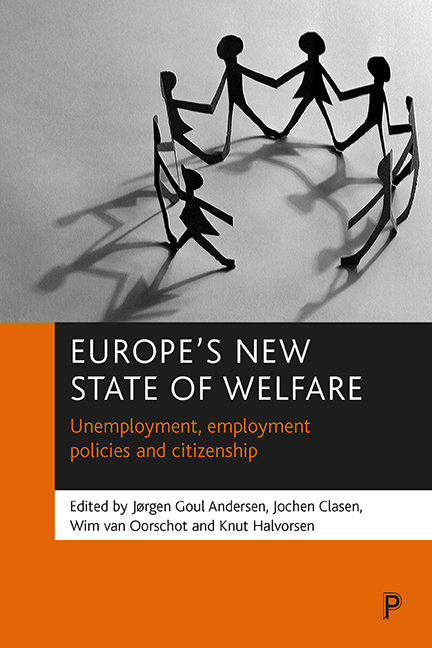Book contents
- Frontmatter
- Contents
- Notes on contributors
- Glossary
- Preface
- one Changing labour markets, unemployment and unemployment policies in a citizenship perspective
- two Employment and unemployment in Europe: overview and new trends
- three Unemployment and unemployment policy in the UK: increasing employability and redefining citizenship
- four To be or not to be employed? Unemployment in a ‘work society’
- five France: the impossible new social compromise?
- six Labour market participation in the Netherlands: trends, policies and outcomes
- seven Is high unemployment due to welfare state protection? Lessons from the Swedish experience
- eight Denmark: from the edge of the abyss to a sustainable welfare state
- nine Unemployment and (un)employment policies in Norway: the case of an affluent but oil-dependent economy: the paradox of plenty?
- ten Unemployment and unemployment policy in Finland
- eleven Slovenia’s navigation through a turbulent transition
- twelve Unemployment and unemployment policy in Switzerland
- thirteen Work, welfare and citizenship: diversity and variation within European (un)employment policy
- References
- Index
- Also available from The Policy Press
nine - Unemployment and (un)employment policies in Norway: the case of an affluent but oil-dependent economy: the paradox of plenty?
Published online by Cambridge University Press: 20 January 2022
- Frontmatter
- Contents
- Notes on contributors
- Glossary
- Preface
- one Changing labour markets, unemployment and unemployment policies in a citizenship perspective
- two Employment and unemployment in Europe: overview and new trends
- three Unemployment and unemployment policy in the UK: increasing employability and redefining citizenship
- four To be or not to be employed? Unemployment in a ‘work society’
- five France: the impossible new social compromise?
- six Labour market participation in the Netherlands: trends, policies and outcomes
- seven Is high unemployment due to welfare state protection? Lessons from the Swedish experience
- eight Denmark: from the edge of the abyss to a sustainable welfare state
- nine Unemployment and (un)employment policies in Norway: the case of an affluent but oil-dependent economy: the paradox of plenty?
- ten Unemployment and unemployment policy in Finland
- eleven Slovenia’s navigation through a turbulent transition
- twelve Unemployment and unemployment policy in Switzerland
- thirteen Work, welfare and citizenship: diversity and variation within European (un)employment policy
- References
- Index
- Also available from The Policy Press
Summary
Introduction
Norway has a strong resource base, but a vulnerable industrial structure. The dilemma for this country is that a fast accumulation of wealth – created by exploiting its natural resource (petroleum) – cannot, in the long run, be a blessing but quite the contrary. This is the ‘the paradox of plenty’, which means that a country is unable to handle a sudden ‘wealth shock’. Netherlands is used as an example: huge state revenues from gas resulted in high inflation, reduced competitiveness, concentration of resources in the oil sector at the expense of other sectors in the economy. It turned out, for example, that it was difficult for the government to keep down expenses to social benefits. It contributed to the so called the ‘Dutch disease’ (Karl, 1997).
For the purpose of this chapter, then, we must ask: is Norway, as a universalistic welfare state, economically sustainable and able to maintain full employment? So far, there has not been any major cut-backs in social benefits, but it has been suggested that it is necessary to reform part of its social security scheme in order to reduce the inflow into sickness benefits, disability pension and early retirement pension. In common with many other countries, Norway fears that that demographic changes (low increases of working-age and elderly populations) will make it difficult to meet the demand for workers, especially in the public sector (healthcare), without inducing inflation and reduced competitiveness for the private sector of the economy.
Are Norwegian institutions (especially the labour market and the welfare state) able to meet the challenges of a wealth shock coming from huge oil revenues, or for that matter new external ‘negative’ shocks coming from a drastic fall in oil prices, such as in 1988 and in 1998? This chapter attempts to answer this by looking at how Norway has managed the 1988-93 recession, and the boom that followed and continues to this day.
Norway’s historical legacy
Countries such as Norway are often called ‘labourers’ societies’ (Arendt, 1958) or ‘employment regimes of the Scandinavian type’, because paid work (wage labour) and a policy of full employment are regarded as cornerstones of the society in general and of the welfare state in particular.
- Type
- Chapter
- Information
- Europe's New State of WelfareUnemployment, Employment Policies and Citizenship, pp. 163 - 180Publisher: Bristol University PressPrint publication year: 2002



